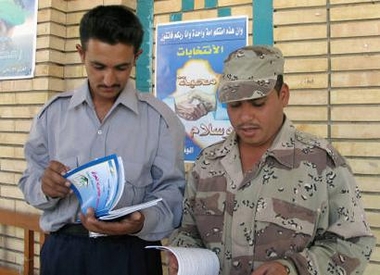|
Iraq unveils security measures for vote
(AP)
Updated: 2005-10-09 08:42
But the organization has gotten a cold reception from some Shiite leaders in the government, resentful over perceived Arab League inaction in response to Saddam Hussein's regime and what they see as the predominantly Sunni league's bias in favor of Iraq's Sunni minority.
Meanwhile, all sides were stepping up their campaigns for and against the constitution. Leaders of the top Sunni political factions met in Baghdad to plan how to rally their followers in the "no" vote, with most of them pushing aside calls for Sunnis to boycott as happened in last January's legislative elections.
"It is a dangerous draft that only helps the interests of imperialism on our soil. This constitution is being imposed by force in a dictatorial way," Mohammed Beshar al-Feydi, of the Committee of Islamic Scholars, told Al-Jazeera television.
In Tikrit, Saddam Hussein's hometown, the Iraqi Islamic Party passed out copies of the constitution to worshippers at a Sunni mosque and urged them to go to the polls to reject it.
A strong Sunni turnout is key for defeating the constitution. Sunnis have a strong enough population in four provinces to have a chance of getting a two-thirds "no" vote. But three of those provinces also have a significant Shiite or Kurdish presence likely to be strongly motivated to vote "yes," so Sunni leaders must drum up voters to outweigh them.
Government media also was pushing for voters to turn out. The state-owned Sabah newspaper ran a contest promising prizes up to $5,000 for anyone who could answer a series of questions about the text of the constitution to prove they'd read it.
Al-Iraqiya television ran call-in and talk shows about the referendum, with people from all sides participating. "I will vote yes to the constitution because it's a guarantee of our rights and an end to dictatorship," said Fadil Abbas, one man in a street interview.

An Iraqi policeman and soldier read copies of Iraq's draft constitution in the town of Kut, 160 kms south of Baghdad October 8, 2005. [Reuters] |
In western Iraq, U.S. troops continued their four-day-old Operation River Gate, a sweep of several towns along the Euphrates River valley, one of two offensives launched last week in Anbar province against insurgents.
The two U.S. soldiers were killed Friday by small arms fire near the town of Haqlaniyah during the operation.
Six other U.S. service members have been killed in past days in River Gate and the second operation, Iron Fist, which ended Thursday night further upriver near the Syrian border. At least 1,952 U.S. service members have died since the Iraq war started in March 2003, according to an Associated Press count.
The military had said the towns were under insurgents' control, but most of the fighters appear to have fled or gone into hiding before the sweeps — leaving Marines and soldiers to deal with booby-trapped streets.
In Haditha, near Haqlaniyah, Iraqi commanders accompanied by U.S. Marines walked through neighborhoods, telling residents that security forces would remain in the city and handing out fliers urging residents to call in tips about the insurgency.
In the latest violence, insurgents killed a local council member in the northern city of Kirkuk in a drive-by shooting. Gunmen also killed a police captain in Baghdad and another in Samarra.
Iraqi soldiers opened fire on a civilian car that failed to stop at a checkpoint in Baghdad, killing the driver and wounding five other occupants, including a child. Four bodies, all bound and shot in the head, were found dumped in separate parts of the capital.
|